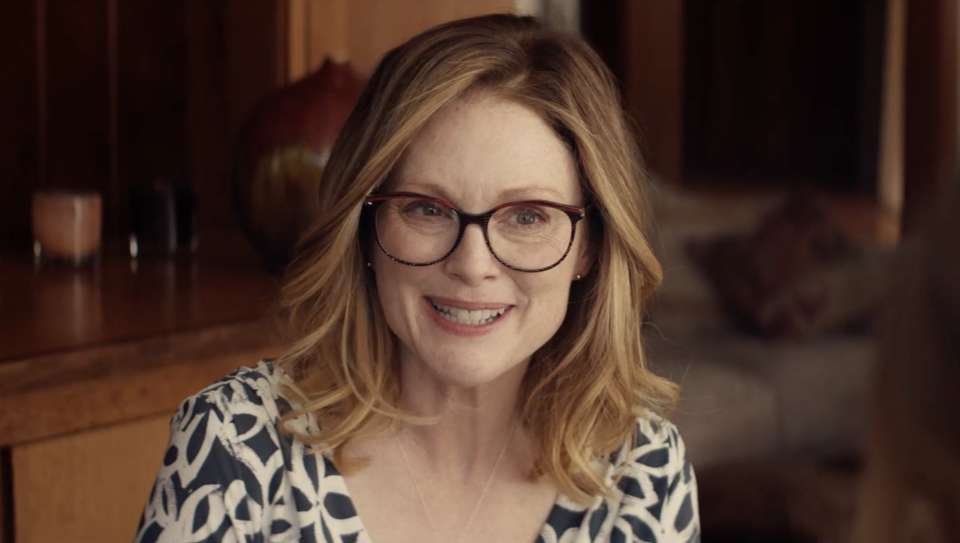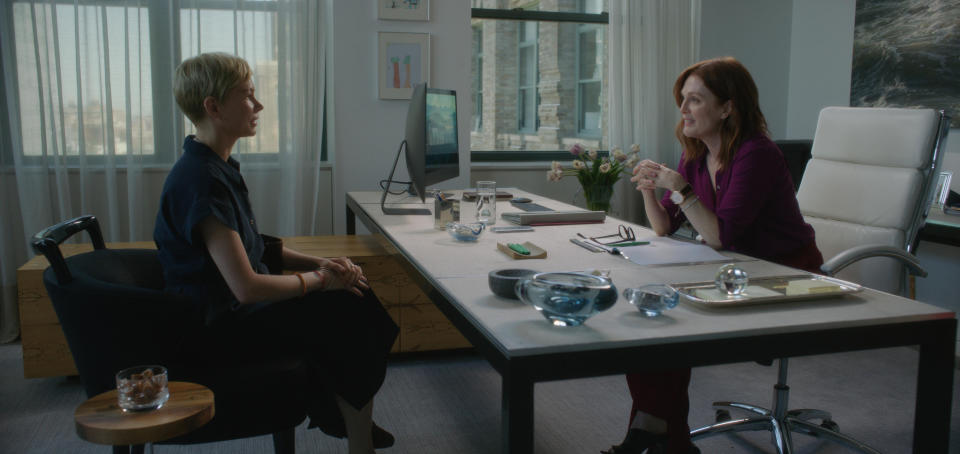Julianne Moore on Doing Remakes Her Way, the Intimacy of ‘Gloria Bell,’ and the Director Who Fired Her

Julianne Moore knows what she likes when she sees it. These days, that happens to mean two very different foreign-language films — one with a radically honest role for a middle-aged star, one that had to be smartly retrofitted for the same ends — remade for American audiences. Starting off her 2019 strong, Moore has already starred in both Sebastián Lelio’s “Gloria Bell” and husband Bart Freundlich’s “After the Wedding,” and not because she’s on the hunt for remakes in a remake-crazed industry, but because both films struck her as having something worth doing again.
The opportunity to play Gloria, a middle-aged mom trying to carve out a fulfilling new life for herself, almost didn’t happen, thanks to the kind of good, old-fashioned mix-up that would not be out of place in a frisky Hollywood comedy. Moore was so taken with Lelio’s 2013 Chilean film “Gloria” that she made it her business to meet with the filmmaker. He was eager to meet the actress, too, but they both approached the meeting under somewhat false pretenses: Moore didn’t know he was open to a remake, Lelio seemed to believe she was anti-remake.
Related stories
Mia Hansen-Løve on 'Maya,' 'Bergman Island,' and Her Addiction to Filmmaking
Samuel L. Jackson and Brie Larson: How a Tough 'Kong' Shoot Was the Start of a Big Partnership
“When we first met, he had the impression that I didn’t want to do a remake of it,” Moore said in a recent interview with IndieWire. “But really what it was, I only wanted to do something with him. I wanted to work with him on it or something or anything. So then he said, ‘Well, I understand you’re not interested in doing this,’ and I was like, ‘No, I would do it if you did it,’ and he was like, ‘I would do it if you did it.’ It sort of happened like that.”
Lelio’s film sticks close to the script of his original, though it moves the action from Santiago to Los Angeles, further builds out Gloria’s family tree, and more deeply explores the unique isolation of living in the big city. For Moore, imitating Paulina García’s vibrant performance in the first film wasn’t exciting — but being able to experience what she saw as an inspiring marriage between actor and filmmaker, two different kinds of creators really able to see each other, thrilled her. Even after playing her own Gloria, she visibly lights up when breaking down what she loved about the first film.
“Gloria Bell”
“I think the way Sebastian filmed her, it was so intimate and so full,” Moore said of García’s work in the first film. “There’s this one shot where she’s washing clothes and singing a song, and she’s so beautiful and so present. The combination of the two of them, the fact that you were seeing this kind of intimacy, and that observation on film, is something I’ve never seen before. She was just real. … The thing that I respond to most when I watch films and performances, is what seems true. And there hadn’t been a truer performance that I had seen. There was something about it that was so, so lovely and warm and always positive. I like seeing movies about people, period.”
A recent film that fit that bill: Chloe Zhao’s “The Rider,” which Moore adored. “It was incredibly intimate and incredibly real, and I was like, ‘Wow, this I have never seen before,'” Moore said. “So that’s what I want to see. I want to see movies about people who are engaging in real life and are doing things that are the drama of regular life. I wouldn’t even say ‘ordinary,’ because I don’t think that the kid in ‘The Rider’ is ordinary. Nor do I think that Gloria is ordinary, but it’s what life is. What is life? Sometimes it’s getting up and going to work and feeding your cat. That’s your life.”
She added, “It’s not some imaginary thing where you’re going to get into a purple spaceship and do something, put on your super-suit. I wish, but that’s not it. Making movies about what we actually can do and what our relationships are and what they mean, that, to me, is really compelling.”
Moore’s other recent feature, husband Bart Freundlich’s “After the Wedding,” is another remake inspired by a popular foreign-language film: Susanne Bier’s 2006 Danish drama of the same name. While “Gloria Bell” dabbles in some location-swapping, Freundlich’s film goes even further, gender-swapping the leading roles, all the better to give Moore and co-star Michelle Williams a pair of meaty, complex roles. As with “Gloria Bell,” Moore was so inspired by the original that she pitched herself for the gig.
She remembered watching Bier’s film with Freundlich and zeroing in on the role of Jørgen Lennart Hansson (played in the film by Rolf Lassgård), a successful businessman who offers up a huge financial deal to a seeming stranger, with some major strings attached. “I was like, ‘Hmm, that’s a part I’d like to play,’ but didn’t really think about it honestly,” Moore said. “Later on in the process, they started talking about the gender swap, and when they did that, I put my hand up and I’m like, ‘That’s the part I’d like to play. Not the other part, that part.'”
Moore was the first star officially cast in the film, and was soon joined by Williams, Abby Quinn, and Billy Crudup, who had previously starred alongside Moore in Freundlich’s 2005 romantic comedy, “Trust the Man.” The film opened this year’s Sundance Film Festival.
“After the Wedding”
But it doesn’t always work out for Moore, even when the four-time Oscar nominee is already settled into a role she wants. Asked about why she left Nicole Holofcener’s original version of “Can You Ever Forgive Me?,” which fell apart in 2015 over “creative differences” (Holofcener went on to co-write the script for the film, eventually directed by Marielle Heller and starring an Oscar-nominated Melissa McCarthy in the role that was once for Moore), the actress didn’t mince words.
“I was fired, that’s why,” Moore said. “She fired me. So, I didn’t want to leave, I was fired.” She hasn’t seen Heller’s film.
And yet other projects she’s long wanted to be a part of are starting to come to fruition. Moore is currently filming Julie Taymor’s “The Glorias: A Life on the Road,” in which she plays Gloria Steinem, as inspired by the feminist heroine’s autobiography, “My Life on the Road.” Asked if she thought getting a Steinem-centric film made in a post-#MeToo climate was easier, Moore answered, “I don’t know. It was hard to get it made now, so it’s not like things have changed that much, but this is happening, and what a cast.”
Alicia Vikander and Lulu Wilson play Steinem at other points in her life, and Moore is effusive when ticking off the rest of the cast. “Bette Midler plays Bella Abzug, Janelle Monae plays Dorothy Pitman Hughes, and Lorraine Toussaint plays Flo Kennedy,” she said. “It’s an amazing group of people and everyone is there because we want to tell the story about Gloria and the women’s movement.”
Read More:Debra Granik and Marielle Heller Open Up About Being Left Out of This Year’s Oscar Conversation
For the past year, Moore has been an outspoken member of Time’s Up, using her status and platform to help campaign for change far beyond just the entertainment industry. She’s thrilled that New York governor Andrew Cuomo recently backed the Time’s Up Safety Agenda, a multi-pronged legislative package that aims to combat sexual harassment and assault through various legal reforms, and believes it’s a huge step “in the right direction.”
When it comes to the entertainment industry, she’s more measured. “It takes a long time to turn a boat around, you know?,” she said. “We’re just talking about a year and a half. It’s not very long, but … many, many more women are producing and directing now, so that’s great. People are making an effort to hire more female directors.”
Still, she bristled a bit at putting labels on everything, especially ones that might put creative expression in some kind of box.
“Why do we have to be so fucking gendered all the time?,” Moore said. “I don’t think there’s a female filmmaker who wants to be called a ‘female filmmaker.’ You just want to be a filmmaker. [In] the same way, being an actor, too — I am an actor. Sometimes I take offense when people talk about Sebastián and how unusual it is because he makes movies about women. I’m like, ‘Why can’t he make beautiful movies about women? Let him.’ Why do we have to keep commenting on it and how unusual it is? I’m like, ‘Let’s just do it.'”
A24 releases “Gloria Bell” in theaters today.
Sign up for Indiewire's Newsletter. For the latest news, follow us on Facebook, Twitter, and Instagram.



